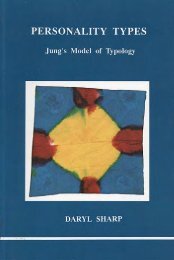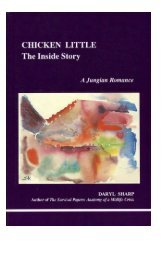Digesting Jung: Food for the Journey - Inner City Books
Digesting Jung: Food for the Journey - Inner City Books
Digesting Jung: Food for the Journey - Inner City Books
Create successful ePaper yourself
Turn your PDF publications into a flip-book with our unique Google optimized e-Paper software.
The Puer/Puella Syndrome 101<br />
The individuating puer—one coming to grips with his attitudes<br />
and behavior patterns—knows that undifferentiated feelings are<br />
highly suspect, especially when <strong>the</strong>y arise in conjunction with <strong>the</strong><br />
use of alcohol or o<strong>the</strong>r drugs. Instead of identifying with his feelings,<br />
he tries to keep some distance from <strong>the</strong>m, which means objectifying<br />
what he is experiencing. He questions himself: Is this what I<br />
really feel? Is this what I want? What are <strong>the</strong> consequences? Can I<br />
live with <strong>the</strong>m? Can I live with myself? How does what I do affect<br />
o<strong>the</strong>rs?<br />
Puers generally have a hard time with commitment. They like to<br />
keep <strong>the</strong>ir options open and can’t bear to be tied down. They act<br />
spontaneously, with little thought of consequences. The individuating<br />
puer has to sacrifice this ra<strong>the</strong>r charming trait—but what he sacrifices<br />
<strong>the</strong>n becomes part of his shadow. In order <strong>the</strong>n not to become<br />
an automaton, ruled by habit and routine, he will have to reassimilate—this<br />
time consciously—his lapsed puer characteristics.<br />
Also symptomatic of puer psychology is <strong>the</strong> feeling of being<br />
special, of having a unique destiny. When you feel like that, it’s<br />
hard to muster <strong>the</strong> energy to earn a living. Compared to what you’re<br />
cut out <strong>for</strong>, <strong>the</strong> daily grind is just too mundane. This is a variety of<br />
inflation. You feel special, so why, you ask yourself, am I doing<br />
something so ordinary?<br />
If this attitude persists, you can cheerfully rationalize wasting<br />
your life, waiting <strong>for</strong> destiny to catch up—or fall from <strong>the</strong> sky. You<br />
play <strong>the</strong> lotteries and buy stocks. You know <strong>the</strong> odds are against<br />
you but you cross your fingers and hope you’ll win, and you hedge<br />
your bets with options and silver futures.<br />
Puers and puellas live a provisional life. There is always <strong>the</strong> fear<br />
of being caught in a situation from which it might not be possible to<br />
escape. Their lot is seldom what <strong>the</strong>y really want; <strong>the</strong>y are always<br />
“about to” do something, to make a change; one day <strong>the</strong>y will do<br />
what is necessary—but not just yet. They are awash in a world of<br />
“maybe”: “Maybe I’ll do this . . . maybe I’ll do that . . .” Plans <strong>for</strong><br />
<strong>the</strong> future come to nothing; life slips away in fantasies of what will










